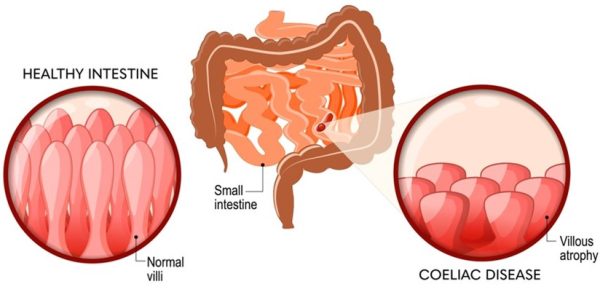13/05/2024
If you suffer from coeliac disease, every meal becomes a potential gamble, and every toaster becomes a trial ground. Around 1% of people living in the UK face the complex reality of living gluten-free, where grains hold the power to trigger discomfort and distress1.
Coeliac Awareness Day provides an opportunity for raising awareness, educating the public, and providing support for individuals living with coeliac disease. It also serves as a platform for fostering community connections and advocating for policy changes to improve access to gluten-free foods and healthcare services. Overall, Coeliac Awareness Day plays a crucial role in empowering individuals with coeliac disease to lead healthier lives.
In this article, we’ll look at the intricacies of coeliac disease, exploring the genetic factors at play, diagnosis, complications, and the a few of the common myths associated with coeliac disease.
What is Coeliac Disease?
Coeliac disease is a condition in which your immune system recognises gluten as a pathogen, causing it to attack the tissues which make up your small intestine, or gut, stopping your body from properly absorbing the nutrients from food1. Commonly mistaken for inflammatory bowel syndrome (IBS), it can take, on average, 13 years to get diagnosed with coeliac disease2 and they are the lucky ones! It is estimated that around 70% of people who are coeliac are undiagnosed1.
Gluten is a dietary protein found mainly in wheat, barely, and rye. These grains are commonly found in various foods including pasta, most types of bread, cakes, breakfast cereals, most beers, and some ready meals and sauces.
Those considered to be at high risk include people with type 1 diabetes, autoimmune thyroid disease, Down’s syndrome, and Turner’s syndrome3. If you have a first degree relative with coeliac disease your also at higher risk and data suggest cases are more common in women, although this is difficult to confirm due to the high rates of under- and misdiagnosis3.
What Causes Coeliac Disease?
Coeliac disease is an autoimmune condition. So, when you consume gluten, your immune system sees it as a threat and attacks, causing collateral damage to your gut and disrupting your ability to absorb the goodness from the foods you eat.
A healthy gut is lined with small, finger-like projections known as villi. The villi are essential for absorbing the nutrients from food. In coeliac disease, the autoimmune reaction damages these villi, causing them to become inflamed and flat, or in some cases, completely disappear, stopping them from effectively taking in the substances you need from your meals1. This is known as villous atrophy.

Its not entirely clear what causes coeliac disease. However, its thought to be the result of a combination of genetic and environmental factors. The high levels of undiagnosed and misdiagnosed coeliac disease mean methods of identifying this condition are crucial.
Environmental factors can be difficult to measure. But when it comes to genetic testing, we take the cake.
Symptoms of Coeliac Disease
There are various symptoms associated with coeliac disease, many of which are nonspecific, further complicating the diagnostic pathway. Common symptoms include3:
- Stomach ache.
- Bloating and flatulence.
Nonspecific symptoms include3:
- Unintentional weight loss.
- An itchy rash.
- Nerve damage.
- Ataxia – a group of disorders that affect co-ordination, balance, and speech.
Complications of Coeliac Disease
Complications are uncommon in those who have been diagnosed and have eliminated gluten from their diet. However, in those who lack a diagnosis, particularly in milder cases, complications can occur. Common complications may include3:
- Weakening of bones or osteoporosis.
- Iron deficiency anaemia.
- Vitamin B12 deficiency anaemia.
- Folate deficiency anaemia.
Untreated coeliac disease is also associated with more severe complications which tend to be less common. These include some forms of cancer, like bowel cancer, and problems in pregnancy, such as low infant birth weight3.
Myths about Coeliac Disease
"A little bit won't hurt".
Small amounts of gluten, even a breadcrumb, can be enough to cause damage to the gut of someone with coeliac disease. This is why avoiding cross contamination is crucial!
"Coeliac Disease is a food allergy".
Many people are unaware that coeliac disease is synonymous with gluten intolerance. The truth is it isn’t an allergy at all. As we’ve mentioned, it’s an autoimmune condition.
"You need to have gut symptoms to have coeliac disease".
In reality, coeliac disease is a multisystem disorder. While its origins may lie in the gut, symptoms can affect any part of the body.
"Only children ever get coeliac disease."
False! While many cases are diagnosed in children it can be diagnosed at any age – the most common age for a coeliac disease diagnosis is between 40-60 years old.
"You'll outgrow coeliac disease."
Coeliac disease is a lifelong condition, and the only treatment is a gluten-free diet. If you begin eating gluten again, your symptoms and risk of complications will also resurface.
Blood Tests for Coeliac Disease at Randox Health
Genetic Coeliac Disease Testing
The high levels of undiagnosed and misdiagnosed illustrates the importance of testing to identify those who are at risk, and ultimately suffer from coeliac disease. At Randox health, we offer Genetic Coeliac Disease Testing.
This blood test for coeliac disease analyses your HLA-DQ risk markers to provide you with an accurate assessment of your risk of coeliac disease. You’ll receive your results and personalised report within 1-2 weeks of our laboratory receiving your blood sample. You can even choose to book an appointment with one of our GPs.
Nutrition and Lifestyle DNA
In the Nutrition and Lifestyle DNA package, we test for variations in your genetic code that influence your response to nutrition, exercise, and other lifestyle factors as well as your predisposition to certain nutritional diseases, including coeliac disease. Some of the common deficiencies and intolerance included are:
- Lactose Intolerance
- Gluten Intolerance
- Vitamin B12 deficiency risk
- Vitamin C deficiency risk
- Vitamin D deficiency risk
- Calcium deficiency risk
- Magnesium deficiency risk
- And more!
If you’d like to read more about this test, feel free to read our blog: How a Genetic Health Test can Show your Ideal Workout and Diet Plan.
Coeliac Disease Antibody Testing
Anti-tissue transglutaminase (tTG) antibodies are highly specific and sensitive markers for diagnosing coeliac disease. In coeliac disease, ingestion of gluten leads to the production of these antibodies, which target tissue transglutaminase, an enzyme involved in tissue repair and found abundantly in the small intestine. The presence of these antibodies indicates an immune-mediated damage to the intestinal lining.
In our Discovery, Everyman/Everywoman, and Digestive Health packages, we include testing for tTG antibodies, to provide an overview of the essential health areas, a comprehensive assessment of your general health, or a targeted analysis of your gut health, respectively.
By determining your risk of coeliac disease with a blood test, you can find out if you’re rolling the dice each time you have toast, or if you’re holding all aces when it comes to your gut health. Book online today at our website using the links above, or you can get in touch with us on any of our socials, or by completing our enquiry form.
References:
- Coeliac UK. About coeliac disease. https://www.coeliac.org.uk/information-and-support/coeliac-disease/about-coeliac-disease/.
- Coeliac UK. Diagnosis of coeliac disease. https://www.coeliac.org.uk/healthcare-professionals/diagnosis/.
- NHS. Coeliac disease. https://www.nhs.uk/conditions/coeliac-disease/.
- Flores Monar G V, Islam H, Puttagunta SM, et al. Association Between Type 1 Diabetes Mellitus and Celiac Disease: Autoimmune Disorders With a Shared Genetic Background. Cureus. Published online March 7, 2022. doi:10.7759/cureus.22912



